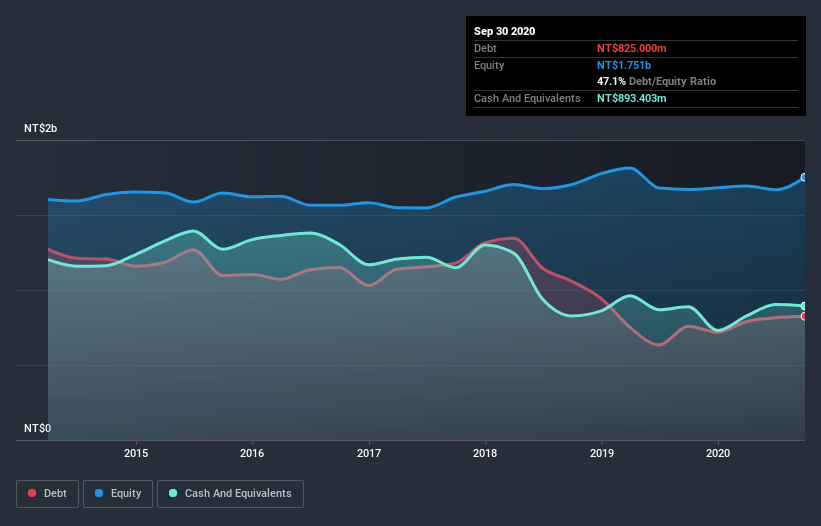Some say volatility, rather than debt, is the best way to think about risk as an investor, but Warren Buffett famously said that 'Volatility is far from synonymous with risk.' When we think about how risky a company is, we always like to look at its use of debt, since debt overload can lead to ruin. Importantly, Jung Shing Wire Co., Ltd. (TPE:1617) does carry debt. But the real question is whether this debt is making the company risky.
What Risk Does Debt Bring?
Generally speaking, debt only becomes a real problem when a company can't easily pay it off, either by raising capital or with its own cash flow. In the worst case scenario, a company can go bankrupt if it cannot pay its creditors. However, a more common (but still painful) scenario is that it has to raise new equity capital at a low price, thus permanently diluting shareholders. Having said that, the most common situation is where a company manages its debt reasonably well - and to its own advantage. When we think about a company's use of debt, we first look at cash and debt together.
View our latest analysis for Jung Shing Wire
What Is Jung Shing Wire's Net Debt?
The image below, which you can click on for greater detail, shows that at September 2020 Jung Shing Wire had debt of NT$825.0m, up from NT$758.7m in one year. However, its balance sheet shows it holds NT$893.4m in cash, so it actually has NT$68.4m net cash.

How Healthy Is Jung Shing Wire's Balance Sheet?
According to the last reported balance sheet, Jung Shing Wire had liabilities of NT$962.0m due within 12 months, and liabilities of NT$172.0m due beyond 12 months. Offsetting these obligations, it had cash of NT$893.4m as well as receivables valued at NT$706.8m due within 12 months. So it actually has NT$466.2m more liquid assets than total liabilities.
It's good to see that Jung Shing Wire has plenty of liquidity on its balance sheet, suggesting conservative management of liabilities. Because it has plenty of assets, it is unlikely to have trouble with its lenders. Succinctly put, Jung Shing Wire boasts net cash, so it's fair to say it does not have a heavy debt load!
Better yet, Jung Shing Wire grew its EBIT by 114% last year, which is an impressive improvement. If maintained that growth will make the debt even more manageable in the years ahead. There's no doubt that we learn most about debt from the balance sheet. But it is Jung Shing Wire's earnings that will influence how the balance sheet holds up in the future. So if you're keen to discover more about its earnings, it might be worth checking out this graph of its long term earnings trend.
Finally, while the tax-man may adore accounting profits, lenders only accept cold hard cash. Jung Shing Wire may have net cash on the balance sheet, but it is still interesting to look at how well the business converts its earnings before interest and tax (EBIT) to free cash flow, because that will influence both its need for, and its capacity to manage debt. Over the last three years, Jung Shing Wire recorded free cash flow worth a fulsome 97% of its EBIT, which is stronger than we'd usually expect. That puts it in a very strong position to pay down debt.
Summing up
While it is always sensible to investigate a company's debt, in this case Jung Shing Wire has NT$68.4m in net cash and a decent-looking balance sheet. The cherry on top was that in converted 97% of that EBIT to free cash flow, bringing in NT$59m. When it comes to Jung Shing Wire's debt, we sufficiently relaxed that our mind turns to the jacuzzi. The balance sheet is clearly the area to focus on when you are analysing debt. But ultimately, every company can contain risks that exist outside of the balance sheet. Like risks, for instance. Every company has them, and we've spotted 3 warning signs for Jung Shing Wire (of which 1 is potentially serious!) you should know about.
When all is said and done, sometimes its easier to focus on companies that don't even need debt. Readers can access a list of growth stocks with zero net debt 100% free, right now.
If you decide to trade Jung Shing Wire, use the lowest-cost* platform that is rated #1 Overall by Barron’s, Interactive Brokers. Trade stocks, options, futures, forex, bonds and funds on 135 markets, all from a single integrated account. Promoted
New: Manage All Your Stock Portfolios in One Place
We've created the ultimate portfolio companion for stock investors, and it's free.
• Connect an unlimited number of Portfolios and see your total in one currency
• Be alerted to new Warning Signs or Risks via email or mobile
• Track the Fair Value of your stocks
This article by Simply Wall St is general in nature. It does not constitute a recommendation to buy or sell any stock, and does not take account of your objectives, or your financial situation. We aim to bring you long-term focused analysis driven by fundamental data. Note that our analysis may not factor in the latest price-sensitive company announcements or qualitative material. Simply Wall St has no position in any stocks mentioned.
*Interactive Brokers Rated Lowest Cost Broker by StockBrokers.com Annual Online Review 2020
Have feedback on this article? Concerned about the content? Get in touch with us directly. Alternatively, email editorial-team (at) simplywallst.com.
About TWSE:1617
Jung Shing Wire
Engages in the manufacture and sale of magnet wires in Taiwan, Mainland China, Japan, the Philippines, and internationally.
Adequate balance sheet with low risk.
Market Insights
Community Narratives



